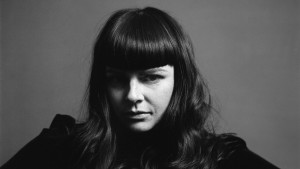
Flying Hórses signs to Montreal imprint Bonsound and announces Reverie, her sophomore album, is due out on February 22, 2019. Stuffed full of texture, using layered vintage musical instrumentation including a giant turn-of-the-century music box (lovingly lusted after and purchased at an antique store in Ottawa, Canada), Sigur Rós’ own 1900’s celeste adding orchestral percussion, with luscious and heavily evocative cello courtesy of Germany’s Sebastian Selke, horns, vibraphone and double-bass, and held down with piano arrangements that guide you through a bleak and stormy musical narrative, there’s a sense that Canadian composer Flying Hórses may have taken her heart into a time machine and found a way to translate its story into an arc of powerfully emotional instrumental music.
This is a heartbreak record, everyone has one. If popstars can have them, so can composers, explains Jade Bergeron, the Canadian behind the Flying Hórses moniker. I think we’re finally in a place where it’s okay to talk about the heavy stuff. It isn’t as necessary to have a filter on the darkness, like we used to. My records are generally a reflection of where I am personally. That said; I didn’t want to the music to bring listeners down. The silver lining being that; you can always wake up from a bad dream.
The album Reverie is available to pre-order now.
While it would be easy to place a piano-driven record into a classical composition niche, Flying Hórses takes huge inspiration from post-rock music and places herself firmly in the post-rock/instrumental genre. When I’m composing on the piano or writing for cello and other instrumentation, I reflect on some of the post-rock bands that have influenced me. I don’t see myself as a classical musician, I have very few classical influences. My heart lies in Metal and post-rock.
Godspeed You! Black Emperor’s Efrim Menuck, Grammy award-winner Chilly Gonzales and JUNO award-winning instrumentalist Charles Spearin (Broken Social Scene, Do Make Say Think) were mentors who contributed ideas, direction and feedback through various parts of the Reverie recording process. Charles Spearin contributes instrumentation on Sorg Sea, which was written at the Banff Centre in Alberta, Canada. I wanted to include his ears, but also his hands, if he was willing to play. He is an integral part of Sorg Sea, explains Bergeron. Menuck mixed the music for the Sorg Sea video. Watch and share the video for Sorg Sea, filmed on location in Iceland, directed by Timothee Lambrecq which features actress Anna Maggý Grímsdóttir.
Sorg Sea was released as a short film which also fits within Reverie’s narrative. It is now being offered as a song in two parts (Sorg Sea I and Sorg Sea II), and are, for the first time, available on all streaming services. It’s hitting rock bottom, after hitting THE rock bottom moment, of the record. It allows me to close that chapter of my life. Moving home from Iceland allowed me to remember who I was.
While pop, hip hop and r&b dominate the musical charts worldwide, Reverie has an essential space in this quickly changing world where sense of place and self has become the utmost priority. It’s the kind of gem of a record you need to find and travel with, on your own. It’s always scary when you have to completely let go. I hope this record doesn’t break hearts, and if it does, I hope it also mends a few.
About Flying Hórses
Flying Hórses is Canadian composer Jade Bergeron. Her first record, Tölt, was recorded mostly in Iceland with producer Biggi Birgisson at Sundlaugin Studio and is filled with the sounds of piano, wurlitzer, celesta, glockenspiel, bells, chimes, music boxes and cello. She described her elegiac debut as “a journey through memories.” The record was about childhood, growing up and being a black sheep. Shortly after the release of Tölt she joined the 1631 Recordings roster alongside Oscar-nominated composers Dustin O’Halloran and Hauschka. She was invited to play Iceland Airwaves Music Festival as well as the world-renowned Festival International de Jazz de Montreal. The Banff Centre for Arts and Creativity welcomed Flying Hórses to work and collaborate with JUNO award-winner Charles Spearin (Broken Social Scene, Do Make Say Think).
Flying Hórses was nominated for the 2018 Prism Prize for Best Canadian Music Video for the title track of her album Tölt, alongside Leonard Cohen, The Weeknd, Feist, and Grimes. Award-winning Director Alexandre Richard from Quebec production house Cinearcale that explores the bliss and trauma of childhood in the video, which was premiered on The Fader. Richard also won Best Director at the Paris International Music Video Competition in 2017 for the video. Watch it here.
